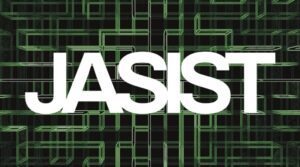SIG-Infolearn Events
This is part 5 of the blog series where we share reflections from our 2025 NEASIS&T Conference Support Award recipients, offering a glimpse into the value and impact of the 2025 ASIS&T Annual Meeting. Through their experiences, we aim to highlight the learning, networking, and growth that make this event so impactful. Uhjin had already recently…
Read MoreThe Association for Information Science and Technology (ASIS&T) Board is looking for a new Editor-in-Chief of The Journal of the Association of Information Science & Technology, the official journal of the ASIS&T, who has the expertise to drive the journal forward. The Journal of the Association for Information Science and Technology (JASIST) is a leading international forum for peer-reviewed research…
Read MoreThe SIG-BIZ board will be meeting this Thursday, Feb. 12, at 2pm CST. This as an open meeting all SIG-BIZ members are invited. Join Zoom Meetinghttps://oklahoma.zoom.us/j/95884595380?pwd=4ajiDfzuErAjSa07HuarpdbyVgTZSD.1 Meeting ID: 958 8459 5380Passcode: Price102
Read MoreThis is part 4 of the blog series where we share reflections from our 2025 NEASIS&T Conference Support Award recipients, offering a glimpse into the value and impact of the 2025 ASIS&T Annual Meeting. Through their experiences, we aim to highlight the learning, networking, and growth that make this event so impactful. Attending the Association for…
Read MoreThis is part 3 of the blog series where we share reflections from our 2025 NEASIS&T Conference Support Award recipients, offering a glimpse into the value and impact of the 2025 ASIS&T Annual Meeting. Through their experiences, we aim to highlight the learning, networking, and growth that make this event so impactful. In 2025, I marked…
Read MoreHello good info-folk. I am writing to you for the first time in my term as ASIS&T president. As a member of the board of directors and as president-elect, I have worked with several presidents, and admired their collaborative leadership styles, incisive intelligence and good humor. I hope I can fill those big shoes! (Metaphorically…
Read MoreGreetings colleagues, As we move into a new year of activity and opportunity for ASIS&T, I am pleased to reflect on a period marked by momentum, resilience, and forward-looking collaboration across our community. First, I want to celebrate the tremendous success of the 2025 ASIS&T Annual Meeting in Crystal City. Nearly 600 colleagues joined us…
Read MoreThe Board of Directors met on November 15, 2025 in person in Crystal City, Virginia and via Zoom. In attendance were; Ian Ruthven (President) (zoom); Maria Bonn (President-Elect); Chris Cunningham, PhD, (Treasurer); Lu An (Zoom), Anne Barker (SLA Appointee) (zoom), Timothy Dickey, Bhakti Gala; Lisa Hussey; Aylin Imeri; Heather Kotula (SLA Appointee) (zoom), Luanne Sinnamon,…
Read MoreVicki Gregory ASIS&T was saddened to learn of the passing of long-time member Vicki Gregory on January 4. Vicki joined ASIS&T in 1983 and, during her membership tenure, served in the leadership of several SIGs and Chapters, served as Treasurer of ASIS&T from 2008 to 2015, and was awarded the Watson Davis Award for Service…
Read MoreASIS&T will be launching the search for a new Editor-in-Chief of the Journal of the Association for Information Science & Technology (JASIST) in February of 2026. Steve Sawyer, the current Editor-in-Chief, will be retiring from his position in July of 2026. A search committee, chaired by Isto Huvila of Uppsala University, Sweden will be issuing…
Read MoreSIG-Infolearn Events
Dear ASIS&T members, It is time to elect our SIG-STI officers for 2021-2022. We are seeking candidates for the following positions: Chair-Elect Secretary/Treasurer You can nominate yourself or someone else. Please submit the name of your nomination and a brief bio, if you are interested in being a part of creating the future of SIG-STI.…
Read MoreASIS&T’s European Chapter warmly invites students, faculty & practitioners to meet with fellow ASIS&T members, talk about Information Science, and share what you would like to see from the European Chapter in the next year. Time: Friday, December 17th, 2021, 1-2pm UTC/GMT (see https://tinyurl.com/2p8fnj4e for other time zones) Place: Zoom, please see this iConnect post…
Read More● Melissa Ocepek, Chair. mgocepek@illinois.edu ● Annie Chen, Chair Elect, atchen@uw.edu ● Yan Zhang, Immediate Past Chair, yanz@utexas.edu ● Chiyoung Oh, Treasurer, coh@csu.edu ● Yuan Li, Secretary, yuanli@live.unc.edu ● Subaveerapandiyan, A., Communications Officer, subaveerapandiyan@gmail.com ● Tathagata Dhar, Webmaster, tdtathagata@gmail.com ● Nathan Davis, Recruitment/Membership Officer, nathandavis@utexas.edu 2021-2022 SIG-USE Awards Committee: ● Xiaojun (Jenny) Yuan, Co-Chair, xyuan@albany.edu …
Read MoreFlipped Panel on “Publishing Research in Reputed Venues” Date: Thursday, January 6, 2022 Time: 10 AM – 11 AM Eastern Time (ET) Venue: Online ASIS&T SIG-III is proud to announce a Flipped Panel on Publishing Research in Reputed Venues. This event will happen online on January 6, 2022, and will feature some of the most…
Read MoreFostering the Next Generation Authors & Helping People Stay Safe from COVID-19: International Online Workshop for School Librarians ASIS&T South Asia chapter in collaboration with the School Library Association, India is arranging this workshop to introduce an interesting and educational International Digital Story Writing Competition organized by ASIS&T South Asia Chapter, the University of Hong…
Read MoreNEASIST is sponsoring RDMLA Symposium 2022! Please join us for the Research Data Management Librarian Academy (RDMLA) Symposium! The event will be held online and in-person* at the Countway Library of Medicine, Boston, Massachusetts, on Friday, April 22, 2022, 9:00 a.m. ET to 4:30 p.m. ET. The inaugural theme is “Data and Communities: Intersections of…
Read MoreASIS&T South Asia Chapter : Best Research Paper Award 2024-25 Nomination call for ASIS&T South Asia Chapter Best Research Paper Award 2024-2025 is open! Nature of the Award This award was established in 2022 by the South Asia Chapter of the Association for Information Science & Technology (ASIS&T). The award winner will receive a certificate…
Read MoreVoted APPROVE on ISO/DIS 23527, Research activity identifier information technology – Learning, education, training and research (RAiD) Question: Do you approve the technical content of ISO/DIS 23527? Description: This document defines the use and structure of the Research Activity Identifier (RAiD) system. The Research Activity Identifier (RAiD) system includes a registry which supports the identification…
Read MoreVoted YES on Approval of TC46/SC9 N1261 Resolution 2021-20 ISO 3297 Minor Revision Question: Do you approve the proposed resolution TC46/SC9 2021-20 for a minor revision of ISO 3297? Description: ISO/ TC 46/SC 9 resolves to initiate a minor revision of ISO 3297 Information and documentation – International standard serial number (ISSN) to make editorial…
Read More




